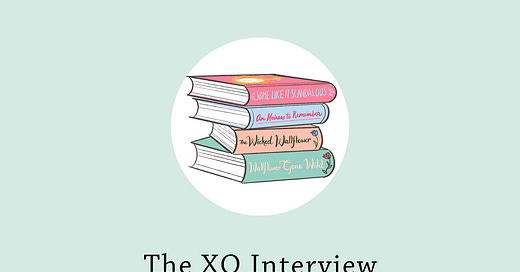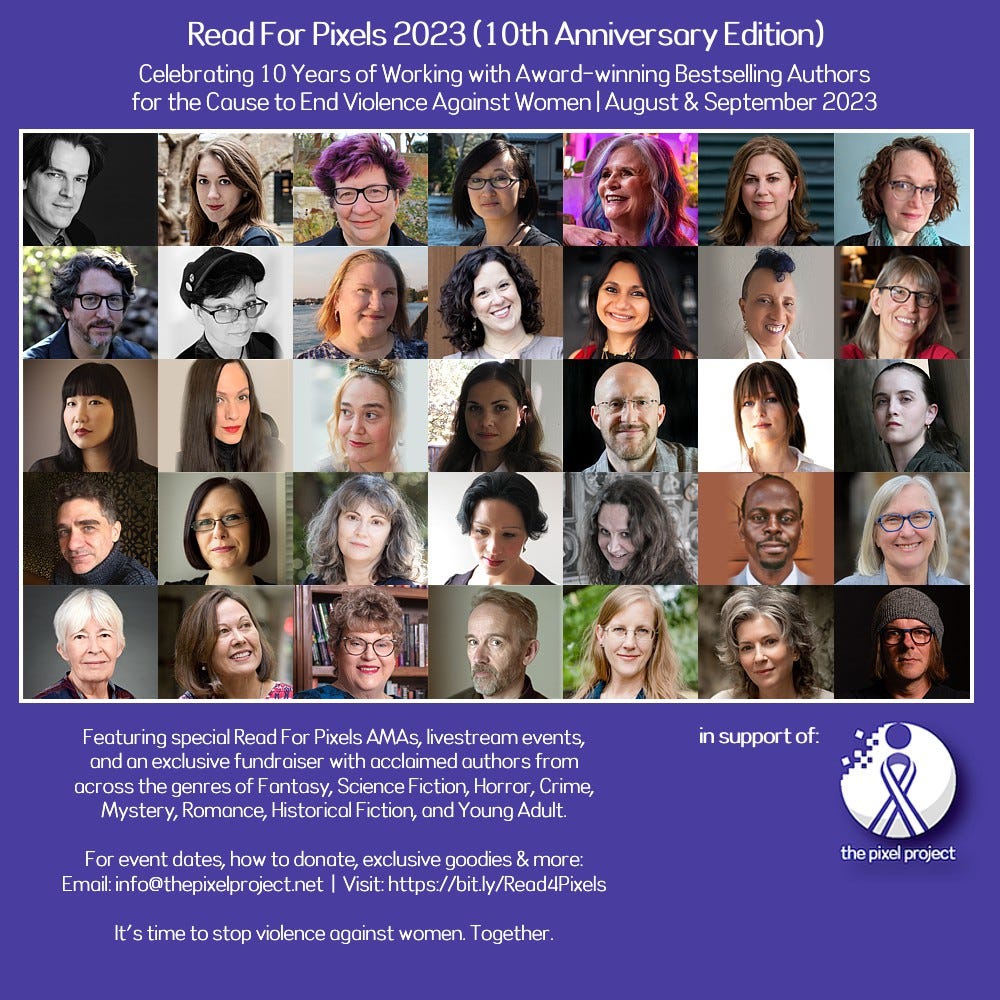When Regina Yau asked me to be a part of The Pixel Project, her online campaign to unite romance novel fans to raise awareness about violence against women, I immediately said yes. I believe in the power of romance to heal, transform and to model good relationships. And I believe in the power of the romance community to come together to make a difference in the world. When I asked Regina to do an XO Interview, she immediately said yes. Keep reading to learn about how pervasive violence against women is and how she sees romance novels connecting to safer, healthier relationships.
PS: You can see The Pixel Project in action with an online panel on September 15th at 8:30pm EST featuring Mimi Matthews, Sonali Dev and Me! Click here to watch on YouTube. Don’t miss the full schedule of events—click here to check them out!
How did you first discover the romance genre? Which book was The One for you?
Like many romance readers, I discovered the genre when I was a teenager. I was already reading the unabridged editions of Jane Austen’s novels as an 11-year-old but only started reading romances by modern authors when I was around 15 – that was when my older cousin and a classmate introduced me to Judith McNaught and Julie Garwood’s novels. I was also very much into Georgette Heyer whose books I discovered myself and that I loved because she’s the direct literary descendent of Jane Austen. Over the years, the list of romance authors I read just keeps getting longer. Right now, aside from your books, I am reading Mimi Matthews, Abby Jimenez, Jackie Lau, Rachel Grant, Sally MacKenzie, Sabrina Jeffries, Serena Bell, Chloe Liese, Kait Nolan, Valerie Bowman, Misty Evans, Toni Anderson, and Susanna Craig.
I don’t think I ever had a romance book that was The One for me and I still don’t because there are so many that I like and my tastes range from historical romances to paranormal romance to romantic suspense depending on my mood. My standards for what makes an excellent romance has definitely changed over the years – some of the older books I used to like aren’t what I’d read anymore because of issues like the lack of consent which is a dealbreaker for me. I also no longer like to read romances where the Hero is domineering and abusive with no respect for women. Similarly, most romance authors that I have read long-term have evolved with the times – that, I think, is the strength of the genre.
You founded The Pixel Project, which specializes in online campaigns to end to raise awareness about and end violence against women (VAW), which is a global public health epidemic. According to the World Health Organization, one in three women have experienced some form of this in their lifetime. What do you want people to know about this type of violence?
Violence against women (VAW) is a major human rights and public health issue that not only affects individual women but also the families and communities they are in. Yet so many people, communities, and institutions refuse to take it seriously because of we are still pretty much living in a patriarchal world.
Most people are unaware (or only dimly aware) that they are complicit in upholding and participating in norms that perpetuate sexism, misogyny, and VAW because all these are so normalized in everyday life. A depressingly common example is when otherwise decent people either turn a blind eye, blame the victim, or go to any lengths to silence a woman who tells them that she was being abused, harassed, or assaulted by a man. We see this very clearly in high-profile cases such as Bill Cosby who was only held accountable after decades of being a serial rapist when over sixty women who were raped or sexually assaulted by him came forward.
We have a very long way to go before VAW can be eradicated and any gains in that direction are precarious as we have seen from the uptick in domestic violence and child marriage during the COVID-19 pandemic as well as the rollbacks in abortion rights by the US Supreme Court which has resulted in an increase in calls to domestic violence helplines about men’s violence against their pregnant wives/partners or who impregnate women to trap them.
The good news is that we can all take steps as individuals help stop VAW in so many ways. Whether you’re a parent teaching your sons to respect women and girls, a friend helping an abused woman escape her husband, or an upstander stepping forward to stop a man from harassing a woman on the street, we can all do our part.
How do you see romance novels connecting to and helping to advance the cause of ending violence against women?
Romance, more than any other genre, is fundamentally about relationships and how people develop and change in response to a relationship, to the person they are involved with, and to the people around them.
Given that women and girls primarily experience violence, sexism, and misogyny at the hands of the men they know and who are, in many cases, their husbands, fiancés, boyfriends, and partners who are supposed to love them, it is so very important that there are both models for healthy egalitarian relationships and healthy masculinities out there.
When people envision models of healthy relationships, they immediately think of how parents and other adults demonstrate healthy non-violent relationships to children and young people. However, the arts and pop culture are also major influences and much of what they show us represent, reflect, and/or reinforce relationship and gendered norms. So romances that depict healthy relationships as well as thoughtful, kind, and non-violent male characters with emotional intelligence who treat women and girls with love and respect are important given that romance is the biggest selling genre today. If the relationships around us aren’t healthy, it’s important to have alternative and easily accessible resources including romance novels from which we can draw inspiration and examples.
The Pixel Project will soon be celebrating the tenth anniversary of the Read for Pixels campaign, which features brings authors and readers together to bring attention to VAW. As part of this campaign, there will also be a panel of romance authors with the topic No More Heartbreak: A 10-Year Retrospective on Sexism, Misogyny, and Violence Against Women in Romance. I’m thrilled to be one of the authors joining—who else will be there and what can people expect?
The panel you will be joining will include Contemporary Romance author Sonali Dev.
During this session, viewers will be able to watch you discussing if and how romance novels and stories as well as attitudes in the romance community have changed over the past 10 years towards sexism, misogyny, and violence against women. They can also type questions into the live chatbox for panelists to answer in real-time about this topic as well as anything they’d like to ask about the romance genre, upcoming releases and events, the panelists’s books, and so on.
The event will take place at 8.30pm Eastern Time on 15 September 2023 (Friday) and it is free to attend. We encourage everyone to bookmark the YouTube page and add it to their calendar and look forward to seeing as many romance fans attending as possible.
And please tell us about the fundraiser!
The Pixel Project has been holding Read For Pixels fundraisers twice a year since the campaign started in 2023. Through the campaign, award-winning and bestselling authors from various genres treat donors to cool, unique, and exclusive goodies as “thank you” gifts for donating to support our anti-violence against women work.
This September’s fundraiser is a very special milestone event because it is held in celebration of the 10th anniversary of the Read For Pixels campaign. For the first time, we will be attempting to raise $10,000 dollars instead of our usual $5,000 fundraising goal. Yes - $10,000 for the 10th anniversary! We have never ever managed to reach $10,000 in the past and we hope that romance fans and readers can help us break this record this September.
Over 40 authors and quite a few publishers have donated all manner of bookish treats ranging from author-curated gift bundles to signed collectible editions to stories written just for donors. For romance fans, we have some heart-melting treats. Joining you are major names in Romance including Eloisa James, Mimi Matthews, Nalini Singh, P.C. Cast, and Sonali Dev who will all be offering some lovely romance-centered perks!
Romance fans and readers who wish to snag a goodie or just make a donation to us can go to here.
Our fundraiser uses the crowdfunding format, so it’s all first-come, first-served. If you want one of Maya’s goodies on offer as your gift for donating to us (or indeed, any goodie available), you have be quick! Hot tip: Visit the page every Friday throughout September as we’ll be releasing a fresh round of goodies on a weekly basis.
How do romance novels give you joy?
As an anti-violence against women activist and advocate who sees just how much male violence and other destructive male behaviour there is in daily life across the world, it is very hard to be optimistic about straight cis men when it comes to relationships and how they treat women and girls in general.
The romance novels I read give me joy at the end of a long day at work not just because a great romance story helps me escape the stresses of life and work for a little while, but also because they help me retain some optimism that if we can imagine better men, someday there will be better men.
Romance novels give me hope that straight cis men as a demographic might someday become what we women envision them to be – not perfect but respectful of women and girls as equals (and genuinely like us as persons in our own right), emotionally literate (and proactively work on themselves if they aren’t), cease being sexist and misogynistic, and stop resorting to violence as a default response whenever they are faced with any kind of problem.
The romance genre is often accused of giving women “unrealistic” expectations for men and their romantic and sexual relationships. So to wrap up my answer, I will leave a question for the people who are so vociferously critical of romance:
What is so darn scary about the idea of women and girls reading stories that teach and encourage them to expect men to be better people and to treat women as equals who are just as worthy of respect, love, and having our own lives and achievements?




I have so much to say on this topic, but I’ll start here and probably continue the conversation at some point in Love Notes from Tara (xoxoTara.substack.com).
Toxic masculinity and VAW, as presented in some romance novels I’ve read, merely reflects what women experience in real life.
For a survivor, there can be power in reading a story that in some way mimics a traumatic personal even yet lets you vicariously experience a more positive outcome than what you actually lived.
Personally, I prefer to read and write heroes who would never engage in any kind of violence against women, whether physical or psychological.
Yet I don’t disparage the stories that may have given a reader a sense they are seen and valued, especially if that book helps a survivor to work through their trauma and grief and reach a place of healing.